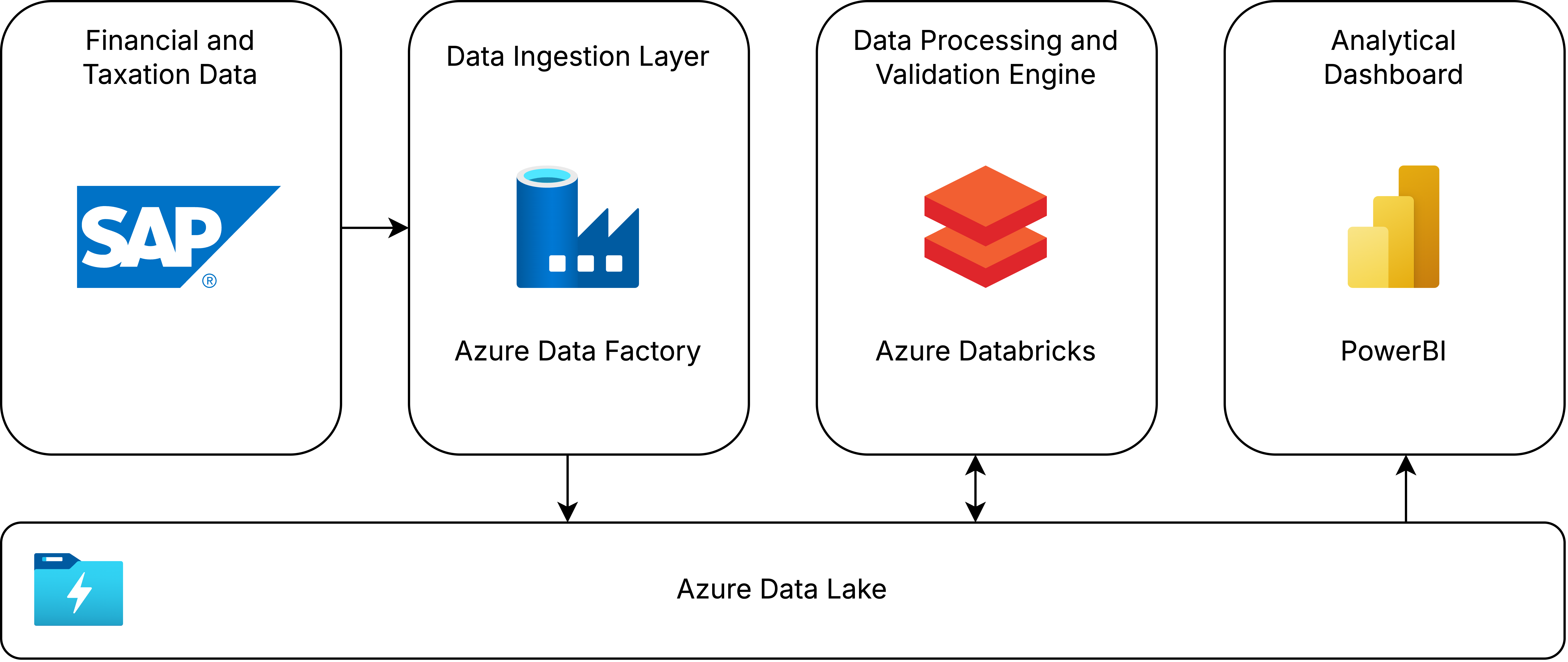Transforming Tax Reporting for a Global Consumer Goods Company : A Cloud-Native Approach
Introduction
In today’s complex multinational business environment, managing tax compliance across global operations presents immense challenges. When a leading global consumer goods company needed to improve visibility of their tax contribution data across 113 countries, a comprehensive enterprise tax platform emerged as the solution. This case study explores the architecture and implementation details of a system that transformed tax reporting capabilities - a solution I helped design in close collaboration with business stakeholders to align technical choices with complex regulatory and operational requirements.
The Challenge
The client, a CPG giant with worldwide footprint faced significant challenges in managing their global tax operations:
- Data Fragmentation: Tax data was scattered across multiple enterprise systems in 113 countries
- Manual Processing: Tax teams spent excessive time manually collecting and reconciling data
- Limited Visibility: Executives lacked a unified view of global tax contributions and liabilities
- Compliance Risks: Inconsistent data collection methods increased the risk of reporting errors
- Resource Intensity: Generating comprehensive tax reports required weeks of effort
The ideal solution would centralize tax data from diverse sources, standardize reporting processes, and provide real-time insights to stakeholders at all levels.
Solution Architecture
We designed a cloud-native tax reporting platform with the following components:
- Data Ingestion Layer: Automated ETL pipelines built with Azure Data Factory to extract data from various enterprise systems, including SAP
- Data Lake Storage: Raw and processed data stored in Azure Data Lake for maximum flexibility and scale
- Data Processing and Validation Engine: PySpark workflows on Azure Databricks for transformation and analysis with custom python modules for automated data cleansing and validation.
- Analytical Dashboard: Power BI reports for visualization and executive insights

Implementation
SAP Integration via ODP
One of the core data sources was the client’s SAP landscape, where critical financial and tax data resided. To ensure efficient and scalable extraction from SAP, we integrated Operational Data Provisioning (ODP) as the extraction framework.
- Delta Extraction with ODQ: Leveraging SAP’s Operational Delta Queue (ODQ), we enabled incremental data loads using delta-enabled extractors, reducing load time and avoiding full data reloads.
- Azure Data Factory Integration: Using ADF’s SAP ODP connector and a self-hosted integration runtime, we securely connected to SAP systems and orchestrated daily ingestion pipelines.
This approach provided reliable, audit-friendly data ingestion from SAP, reduced system load, and ensured consistency across country-specific reporting.
ETL Pipeline Design & Development
The architecture employed a flexible pipeline design using Azure Data Factory that could adapt to different data sources and formats across global operations:
- Implementation of incremental data loading patterns minimized processing time and resource utilization
- Parameterized pipeline templates facilitated quick configuration for different countries and regions
- Monitoring and alerting mechanisms ensured consistent pipeline reliability
Data Validation & Cleansing
The solution required robust data quality controls to ensure consistency and accuracy:
- A comprehensive validation framework in Python applied business rules and data quality checks
- An automated reconciliation system identified and flagged discrepancies between source systems
- Data lineage tracking maintained audit trails for regulatory compliance
- Self-healing mechanisms addressed common data quality issues without manual intervention
Data Transformation with PySpark
Azure Databricks and PySpark powered complex data transformations in a distributed environment:
- Scalable PySpark jobs harmonized tax data across different countries
- Optimized Spark configurations improved performance across varying data volumes
Results and Impact
The Enterprise Tax Reporting Platform delivered significant value:
- 50% Reduction in Data Processing Time: The automated ETL pipelines cut data ingestion time in half compared to previous manual processes
- 20% Error Reduction: Automated validation and cleansing techniques significantly improved data reliability
- Improved Compliance: Standardized data processing ensured consistent tax reporting across all regions
- Enhanced Visibility: Executives gained access to real-time tax insights across 113 countries globally
- Audit Readiness: The platform’s comprehensive data lineage features ensured audit preparation time decreased by 40%
Key Learnings
This project provided valuable insights that shape approaches to enterprise data solutions:
- Enterprise Data Complexity: Working with disparate systems across 113 countries reinforced the importance of flexible ETL architecture that can adapt to varied data landscapes.
- Data Quality at Scale: Implementing automated validation demonstrated that data quality rules must balance strictness with adaptability to accommodate legitimate regional variations.
- Performance Optimization: Building transformations for large tax datasets revealed sophisticated techniques for optimizing Spark jobs, particularly for handling skewed data common in financial processing.
- Incremental Processing: Designing pipelines to process only new or changed data proved crucial for meeting timeline requirements and managing cloud resource costs effectively.
- SAP-Specific Expertise: Using ODP and ODQ in SAP enabled structured, low-friction, delta-capable extraction pipelines, offering a blueprint for clean and sustainable data integration.
- Cross-functional Collaboration: Working alongside tax domain experts highlighted how technical solutions must adapt to complex business requirements that vary by region.
This solution design has since been reused across three other domains within the enterprise, including regulatory reporting and internal audits
Technical Stack
- Cloud Platform: Microsoft Azure
- Data Orchestration: Azure Data Factory (with SAP ODP integration and Self Hosted Runtime)
- Data Processing: Azure Databricks, PySpark
- Data Storage: Azure Data Lake
- Programming Languages: Python
- Visualization: Power BI
Conclusion
The Enterprise Tax Platform represents a careful balance between technical performance requirements and the nuances of global tax regulations. The use of SAP’s Operational Data Provisioning (ODP) framework for ingestion enabled a highly scalable, delta-capable pipeline that minimized load times and reduced manual effort. The solution not only addressed immediate reporting needs but established a foundation for data-driven tax planning and compliance that continues to evolve. The architecture patterns and validation frameworks developed during this project offer valuable reference implementations for other global data initiatives.
This project illustratted how cloud-native design principles, when thoughtfully applied to complex enterprise problems, can transform traditionally burdensome processes into efficient, automated systems that enhance both operational capacity and strategic insight.